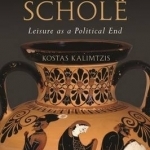An Inquiry into the Philosophical Concept of Schole: Leisure as a Political End
BookThis item doesn’t have any media yet
2017 | Philosophy, Psychology & Social Sciences
Though the ancient Greek philosophical concept of schole is usually translated as 'leisure', there is a vast difference between the two. Leisure, derived from Latin licere, has its roots in Roman otium and connotes the uses of free time in ways permitted by the status quo. Schole is the actualization of mind and one's humanity within a republic that devotes its culture to making such a choice possible. This volume traces the background in Greek culture and the writings of Plato of a daring proposal presented by Aristotle, that schole is a principle for political organization. The concept of schole by and large did not survive Aristotle. To sharpen our understanding of schole the book goes on to identify the concepts of leisure which we have inherited from the intellectuals of the Hellenistic and Roman empires and the early Church Fathers. Schole also had its contrary ascholia - busyness - which Plato described as a social and psychological pathology and his analysis suggests why, due to these ills, current visions of a leisure society are highly unlikely.
Related Items:
| Published by | Bloomsbury Publishing PLC |
| Edition | Unknown |
| ISBN | 9781474237932 |
| Language | N/A |
Images And Data Courtesy Of: Bloomsbury Publishing PLC.
This content (including text, images, videos and other media) is published and used in accordance
with Fair Use.
